- Home
- Nathaniel Hawthorne
The Scarlet Letter Page 3
The Scarlet Letter Read online
Page 3
THE CUSTOM-HOUSE.
INTRODUCTORY TO "THE SCARLET LETTER."
It is a little remarkable, that--though disinclined to talk overmuchof myself and my affairs at the fireside, and to my personalfriends--an autobiographical impulse should twice in my life havetaken possession of me, in addressing the public. The first time wasthree or four years since, when I favored the reader--inexcusably, andfor no earthly reason, that either the indulgent reader or theintrusive author could imagine--with a description of my way of lifein the deep quietude of an Old Manse. And now--because, beyond mydeserts, I was happy enough to find a listener or two on the formeroccasion--I again seize the public by the button, and talk of my threeyears' experience in a Custom-House. The example of the famous"P. P., Clerk of this Parish," was never more faithfully followed. Thetruth seems to be, however, that, when he casts his leaves forth uponthe wind, the author addresses, not the many who will fling aside hisvolume, or never take it up, but the few who will understand him,better than most of his schoolmates or lifemates. Some authors,indeed, do far more than this, and indulge themselves in suchconfidential depths of revelation as could fittingly be addressed,only and exclusively, to the one heart and mind of perfect sympathy;as if the printed book, thrown at large on the wide world, werecertain to find out the divided segment of the writer's own nature,and complete his circle of existence by bringing him into communionwith it. It is scarcely decorous, however, to speak all, even where wespeak impersonally. But, as thoughts are frozen and utterancebenumbed, unless the speaker stand in some true relation with hisaudience, it may be pardonable to imagine that a friend, a kind andapprehensive, though not the closest friend, is listening to our talk;and then, a native reserve being thawed by this genial consciousness,we may prate of the circumstances that lie around us, and even ofourself, but still keep the inmost Me behind its veil. To this extent,and within these limits, an author, methinks, may be autobiographical,without violating either the reader's rights or his own.
It will be seen, likewise, that this Custom-House sketch has a certainpropriety, of a kind always recognized in literature, as explaininghow a large portion of the following pages came into my possession,and as offering proofs of the authenticity of a narrative thereincontained. This, in fact,--a desire to put myself in my true positionas editor, or very little more, of the most prolix among the talesthat make up my volume,--this, and no other, is my true reason forassuming a personal relation with the public. In accomplishing themain purpose, it has appeared allowable, by a few extra touches, togive a faint representation of a mode of life not heretoforedescribed, together with some of the characters that move in it, amongwhom the author happened to make one.
* * * * *
In my native town of Salem, at the head of what, half a century ago,in the days of old King Derby, was a bustling wharf,--but which is nowburdened with decayed wooden warehouses, and exhibits few or nosymptoms of commercial life; except, perhaps, a bark or brig, half-waydown its melancholy length, discharging hides; or, nearer at hand, aNova Scotia schooner, pitching out her cargo of firewood,--at thehead, I say, of this dilapidated wharf, which the tide oftenoverflows, and along which, at the base and in the rear of the row ofbuildings, the track of many languid years is seen in a border ofunthrifty grass,--here, with a view from its front windows adown thisnot very enlivening prospect, and thence across the harbor, stands aspacious edifice of brick. From the loftiest point of its roof, duringprecisely three and a half hours of each forenoon, floats or droops,in breeze or calm, the banner of the republic; but with the thirteenstripes turned vertically, instead of horizontally, and thusindicating that a civil, and not a military post of Uncle Sam'sgovernment is here established. Its front is ornamented with a porticoof half a dozen wooden pillars, supporting a balcony, beneath which aflight of wide granite steps descends towards the street. Over theentrance hovers an enormous specimen of the American eagle, withoutspread wings, a shield before her breast, and, if I recollectaright, a bunch of intermingled thunderbolts and barbed arrows in eachclaw. With the customary infirmity of temper that characterizes thisunhappy fowl, she appears, by the fierceness of her beak and eye, andthe general truculency of her attitude, to threaten mischief to theinoffensive community; and especially to warn all citizens, careful oftheir safety, against intruding on the premises which she overshadowswith her wings. Nevertheless, vixenly as she looks, many people areseeking, at this very moment, to shelter themselves under the wing ofthe federal eagle; imagining, I presume, that her bosom has all thesoftness and snugness of an eider-down pillow. But she has no greattenderness, even in her best of moods, and, sooner or later,--oftenersoon than late,--is apt to fling off her nestlings, with a scratch ofher claw, a dab of her beak, or a rankling wound from her barbedarrows.
The pavement round about the above-described edifice--which we may aswell name at once as the Custom-House of the port--has grass enoughgrowing in its chinks to show that it has not, of late days, been wornby any multitudinous resort of business. In some months of the year,however, there often chances a forenoon when affairs move onward witha livelier tread. Such occasions might remind the elderly citizen ofthat period before the last war with England, when Salem was a port byitself; not scorned, as she is now, by her own merchants andship-owners, who permit her wharves to crumble to ruin, while theirventures go to swell, needlessly and imperceptibly, the mighty floodof commerce at New York or Boston. On some such morning, when three orfour vessels happen to have arrived at once,--usually from Africa orSouth America,--or to be on the verge of their departure thitherward,there is a sound of frequent feet, passing briskly up and down thegranite steps. Here, before his own wife has greeted him, you maygreet the sea-flushed shipmaster, just in port, with his vessel'spapers under his arm, in a tarnished tin box. Here, too, comes hisowner, cheerful or sombre, gracious or in the sulks, accordingly ashis scheme of the now accomplished voyage has been realized inmerchandise that will readily be turned to gold, or has buried himunder a bulk of incommodities, such as nobody will care to rid him of.Here, likewise,--the germ of the wrinkle-browed, grizzly-bearded,care-worn merchant,--we have the smart young clerk, who gets the tasteof traffic as a wolf-cub does of blood, and already sends adventuresin his master's ships, when he had better be sailing mimic-boats upona mill-pond. Another figure in the scene is the outward-bound sailorin quest of a protection; or the recently arrived one, pale andfeeble, seeking a passport to the hospital. Nor must we forget thecaptains of the rusty little schooners that bring firewood from theBritish provinces; a rough-looking set of tarpaulins, without thealertness of the Yankee aspect, but contributing an item of no slightimportance to our decaying trade.
Cluster all these individuals together, as they sometimes were, withother miscellaneous ones to diversify the group, and, for the timebeing, it made the Custom-House a stirring scene. More frequently,however, on ascending the steps, you would discern--in the entry, ifit were summer time, or in their appropriate rooms, if wintry orinclement weather--a row of venerable figures, sitting inold-fashioned chairs, which were tipped on their hind legs backagainst the wall. Oftentimes they were asleep, but occasionally mightbe heard talking together, in voices between speech and a snore, andwith that lack of energy that distinguishes the occupants ofalmshouses, and all other human beings who depend for subsistence oncharity, on monopolized labor, or anything else, but their ownindependent exertions. These old gentlemen--seated, like Matthew, atthe receipt of customs, but not very liable to be summoned thence,like him, for apostolic errands--were Custom-House officers.
Furthermore, on the left hand as you enter the front door, is acertain room or office, about fifteen feet square, and of a loftyheight; with two of its arched windows commanding a view of theaforesaid dilapidated wharf, and the third looking across a narrowlane, and along a portion of Derby Street. All three give glimpses ofthe shops of grocers, block-makers, slop-sellers, and ship-chandlers;around the doors of which
are generally to be seen, laughing andgossiping, clusters of old salts, and such other wharf-rats as hauntthe Wapping of a seaport. The room itself is cobwebbed, and dingy withold paint; its floor is strewn with gray sand, in a fashion that haselsewhere fallen into long disuse; and it is easy to conclude, fromthe general slovenliness of the place, that this is a sanctuary intowhich womankind, with her tools of magic, the broom and mop, has veryinfrequent access. In the way of furniture, there is a stove with avoluminous funnel; an old pine desk, with a three-legged stool besideit; two or three wooden-bottom chairs, exceedingly decrepit andinfirm; and--not to forget the library--on some shelves, a score ortwo of volumes of the Acts of Congress, and a bulky Digest of theRevenue Laws. A tin pipe ascends through the ceiling, and forms amedium of vocal communication with other parts of the edifice. Andhere, some six months ago,--pacing from corner to corner, or loungingon the long-legged stool, with his elbow on the desk, and his eyeswandering up and down the columns of the morning newspaper,--you mighthave recognized, honored reader, the same individual who welcomed youinto his cheery little study, where the sunshine glimmered sopleasantly through the willow branches, on the western side of the OldManse. But now, should you go thither to seek him, you would inquirein vain for the Locofoco Surveyor. The besom of reform has swept himout of office; and a worthier successor wears his dignity, and pocketshis emoluments.
This old town of Salem--my native place, though I have dwelt much awayfrom it, both in boyhood and maturer years--possesses, or did possess,a hold on my affections, the force of which I have never realizedduring my seasons of actual residence here. Indeed, so far as itsphysical aspect is concerned, with its flat, unvaried surface, coveredchiefly with wooden houses, few or none of which pretend toarchitectural beauty,--its irregularity, which is neither picturesquenor quaint, but only tame,--its long and lazy street, loungingwearisomely through the whole extent of the peninsula, with GallowsHill and New Guinea at one end, and a view of the almshouse at theother,--such being the features of my native town, it would be quiteas reasonable to form a sentimental attachment to a disarrangedchecker-board. And yet, though invariably happiest elsewhere, there iswithin me a feeling for old Salem, which, in lack of a better phrase,I must be content to call affection. The sentiment is probablyassignable to the deep and aged roots which my family has struck intothe soil. It is now nearly two centuries and a quarter since theoriginal Briton, the earliest emigrant of my name, made his appearancein the wild and forest-bordered settlement, which has since become acity. And here his descendants have been born and died, and havemingled their earthy substance with the soil; until no small portionof it must necessarily be akin to the mortal frame wherewith, for alittle while, I walk the streets. In part, therefore, the attachmentwhich I speak of is the mere sensuous sympathy of dust for dust. Fewof my countrymen can know what it is; nor, as frequent transplantationis perhaps better for the stock, need they consider it desirable toknow.
But the sentiment has likewise its moral quality. The figure of thatfirst ancestor, invested by family tradition with a dim and duskygrandeur, was present to my boyish imagination, as far back as I canremember. It still haunts me, and induces a sort of home-feeling withthe past, which I scarcely claim in reference to the present phase ofthe town. I seem to have a stronger claim to a residence here onaccount of this grave, bearded, sable-cloaked and steeple-crownedprogenitor,--who came so early, with his Bible and his sword, andtrode the unworn street with such a stately port, and made so large afigure, as a man of war and peace,--a stronger claim than for myself,whose name is seldom heard and my face hardly known. He was a soldier,legislator, judge; he was a ruler in the Church; he had all thePuritanic traits, both good and evil. He was likewise a bitterpersecutor, as witness the Quakers, who have remembered him in theirhistories, and relate an incident of his hard severity towards a womanof their sect, which will last longer, it is to be feared, than anyrecord of his better deeds, although these were many. His son, too,inherited the persecuting spirit, and made himself so conspicuous inthe martyrdom of the witches, that their blood may fairly be said tohave left a stain upon him. So deep a stain, indeed, that his old drybones, in the Charter Street burial-ground, must still retain it, ifthey have not crumbled utterly to dust! I know not whether theseancestors of mine bethought themselves to repent, and ask pardon ofHeaven for their cruelties; or whether they are now groaning under theheavy consequences of them, in another state of being. At all events,I, the present writer, as their representative, hereby take shame uponmyself for their sakes, and pray that any curse incurred by them--as Ihave heard, and as the dreary and unprosperous condition of the race,for many a long year back, would argue to exist--may be now andhenceforth removed.
Doubtless, however, either of these stern and black-browed Puritanswould have thought it quite a sufficient retribution for his sins,that, after so long a lapse of years, the old trunk of the familytree, with so much venerable moss upon it, should have borne, as itstopmost bough, an idler like myself. No aim, that I have evercherished, would they recognize as laudable; no success of mine--if mylife, beyond its domestic scope, had ever been brightened bysuccess--would they deem otherwise than worthless, if not positivelydisgraceful. "What is he?" murmurs one gray shadow of my forefathersto the other. "A writer of story-books! What kind of a business inlife--what mode of glorifying God, or being serviceable to mankind inhis day and generation--may that be? Why, the degenerate fellow mightas well have been a fiddler!" Such are the compliments bandied betweenmy great-grandsires and myself, across the gulf of time! And yet, letthem scorn me as they will, strong traits of their nature haveintertwined themselves with mine.
Planted deep, in the town's earliest infancy and childhood, by thesetwo earnest and energetic men, the race has ever since subsisted here;always, too, in respectability; never, so far as I have known,disgraced by a single unworthy member; but seldom or never, on theother hand, after the first two generations, performing any memorabledeed, or so much as putting forward a claim to public notice.Gradually, they have sunk almost out of sight; as old houses, here andthere about the streets, get covered half-way to the eaves by theaccumulation of new soil. From father to son, for above a hundredyears, they followed the sea; a gray-headed shipmaster, in eachgeneration, retiring from the quarter-deck to the homestead, while aboy of fourteen took the hereditary place before the mast, confrontingthe salt spray and the gale, which had blustered against his sire andgrandsire. The boy, also, in due time, passed from the forecastle tothe cabin, spent a tempestuous manhood, and returned from hisworld-wanderings, to grow old, and die, and mingle his dust with thenatal earth. This long connection of a family with one spot, as itsplace of birth and burial, creates a kindred between the human beingand the locality, quite independent of any charm in the scenery ormoral circumstances that surround him. It is not love, but instinct.The new inhabitant--who came himself from a foreign land, or whosefather or grandfather came--has little claim to be called a Salemite;he has no conception of the oyster-like tenacity with which an oldsettler, over whom his third century is creeping, clings to the spotwhere his successive generations have been imbedded. It is no matterthat the place is joyless for him; that he is weary of the old woodenhouses, the mud and dust, the dead level of site and sentiment, thechill east wind, and the chillest of social atmospheres;--all these,and whatever faults besides he may see or imagine, are nothing to thepurpose. The spell survives, and just as powerfully as if the natalspot were an earthly paradise. So has it been in my case. I felt italmost as a destiny to make Salem my home; so that the mould offeatures and cast of character which had all along been familiarhere,--ever, as one representative of the race lay down in his grave,another assuming, as it were, his sentry-march along the mainstreet,--might still in my little day be seen and recognized in theold town. Nevertheless, this very sentiment is an evidence that theconnection, which has become an unhealthy one, should at last besevered. Human nature will not flourish, any more than a potato, if itbe planted and replanted, for too lon
g a series of generations, in thesame worn-out soil. My children have had other birthplaces, and, sofar as their fortunes may be within my control, shall strike theirroots into unaccustomed earth.
On emerging from the Old Manse, it was chiefly this strange, indolent,unjoyous attachment for my native town, that brought me to fill aplace in Uncle Sam's brick edifice, when I might as well, or better,have gone somewhere else. My doom was on me. It was not the firsttime, nor the second, that I had gone away,--as it seemed,permanently,--but yet returned, like the bad half-penny; or as ifSalem were for me the inevitable centre of the universe. So, one finemorning, I ascended the flight of granite steps, with the President'scommission in my pocket, and was introduced to the corps of gentlemenwho were to aid me in my weighty responsibility, as chief executiveofficer of the Custom-House.
I doubt greatly--or, rather, I do not doubt at all--whether any publicfunctionary of the United States, either in the civil or militaryline, has ever had such a patriarchal body of veterans under hisorders as myself. The whereabouts of the Oldest Inhabitant was at oncesettled, when I looked at them. For upwards of twenty years beforethis epoch, the independent position of the Collector had kept theSalem Custom-House out of the whirlpool of political vicissitude,which makes the tenure of office generally so fragile. A soldier,--NewEngland's most distinguished soldier,--he stood firmly on the pedestalof his gallant services; and, himself secure in the wise liberality ofthe successive administrations through which he had held office, hehad been the safety of his subordinates in many an hour of danger andheart-quake. General Miller was radically conservative; a man overwhose kindly nature habit had no slight influence; attaching himselfstrongly to familiar faces, and with difficulty moved to change, evenwhen change might have brought unquestionable improvement. Thus, ontaking charge of my department, I found few but aged men. They wereancient sea-captains, for the most part, who, after being tost onevery sea, and standing up sturdily against life's tempestuous blasts,had finally drifted into this quiet nook; where, with little todisturb them, except the periodical terrors of a Presidentialelection, they one and all acquired a new lease of existence. Thoughby no means less liable than their fellow-men to age and infirmity,they had evidently some talisman or other that kept death at bay. Twoor three of their number, as I was assured, being gouty and rheumatic,or perhaps bedridden, never dreamed of making their appearance at theCustom-House, during a large part of the year; but, after a torpidwinter, would creep out into the warm sunshine of May or June, golazily about what they termed duty, and, at their own leisure andconvenience, betake themselves to bed again. I must plead guilty tothe charge of abbreviating the official breath of more than one ofthese venerable servants of the republic. They were allowed, on myrepresentation, to rest from their arduous labors, and soonafterwards--as if their sole principle of life had been zeal for theircountry's service, as I verily believe it was--withdrew to a betterworld. It is a pious consolation to me, that, through my interference,a sufficient space was allowed them for repentance of the evil andcorrupt practices into which, as a matter of course, everyCustom-House officer must be supposed to fall. Neither the front northe back entrance of the Custom-House opens on the road to Paradise.
The greater part of my officers were Whigs. It was well for theirvenerable brotherhood that the new Surveyor was not a politician, andthough a faithful Democrat in principle, neither received nor held hisoffice with any reference to political services. Had it beenotherwise,--had an active politician been put into this influentialpost, to assume the easy task of making head against a Whig Collector,whose infirmities withheld him from the personal administration of hisoffice,--hardly a man of the old corps would have drawn the breath ofofficial life, within a month after the exterminating angel had comeup the Custom-House steps. According to the received code in suchmatters, it would have been nothing short of duty, in a politician, tobring every one of those white heads under the axe of the guillotine.It was plain enough to discern, that the old fellows dreaded some suchdiscourtesy at my hands. It pained, and at the same time amused me, tobehold the terrors that attended my advent; to see a furrowed cheek,weather-beaten by half a century of storm, turn ashy pale at theglance of so harmless an individual as myself; to detect, as one oranother addressed me, the tremor of a voice, which, in long-past days,had been wont to bellow through a speaking-trumpet, hoarsely enough tofrighten Boreas himself to silence. They knew, these excellent oldpersons, that, by all established rule,--and, as regarded some ofthem, weighed by their own lack of efficiency for business,--theyought to have given place to younger men, more orthodox in politics,and altogether fitter than themselves to serve our common Uncle. Iknew it too, but could never quite find in my heart to act upon theknowledge. Much and deservedly to my own discredit, therefore, andconsiderably to the detriment of my official conscience, theycontinued, during my incumbency, to creep about the wharves, andloiter up and down the Custom-House steps. They spent a good deal oftime, also, asleep in their accustomed corners, with their chairstilted back against the wall; awaking, however, once or twice in aforenoon, to bore one another with the several thousandth repetitionof old sea-stories, and mouldy jokes, that had grown to be passwordsand countersigns among them.
The discovery was soon made, I imagine, that the new Surveyor had nogreat harm in him. So, with lightsome hearts, and the happyconsciousness of being usefully employed,--in their own behalf, atleast, if not for our beloved country,--these good old gentlemen wentthrough the various formalities of office. Sagaciously, under theirspectacles, did they peep into the holds of vessels! Mighty was theirfuss about little matters, and marvellous, sometimes, the obtusenessthat allowed greater ones to slip between their fingers! Whenever sucha mischance occurred,--when a wagon-load of valuable merchandise hadbeen smuggled ashore, at noonday, perhaps, and directly beneath theirunsuspicious noses,--nothing could exceed the vigilance and alacritywith which they proceeded to lock, and double-lock, and secure withtape and sealing-wax, all the avenues of the delinquent vessel.Instead of a reprimand for their previous negligence, the case seemedrather to require an eulogium on their praiseworthy caution, after themischief had happened; a grateful recognition of the promptitude oftheir zeal, the moment that there was no longer any remedy.
Unless people are more than commonly disagreeable, it is my foolishhabit to contract a kindness for them. The better part of mycompanion's character, if it have a better part, is that which usuallycomes uppermost in my regard, and forms the type whereby I recognizethe man. As most of these old Custom-House officers had good traits,and as my position in reference to them, being paternal andprotective, was favorable to the growth of friendly sentiments, I soongrew to like them all. It was pleasant, in the summer forenoons,--whenthe fervent heat, that almost liquefied the rest of the human family,merely communicated a genial warmth to their half-torpid systems,--itwas pleasant to hear them chatting in the back entry, a row of themall tipped against the wall, as usual; while the frozen witticisms ofpast generations were thawed out, and came bubbling with laughter fromtheir lips. Externally, the jollity of aged men has much in commonwith the mirth of children; the intellect, any more than a deep senseof humor, has little to do with the matter; it is, with both, a gleamthat plays upon the surface, and imparts a sunny and cheery aspectalike to the green branch, and gray, mouldering trunk. In one case,however, it is real sunshine; in the other, it more resembles thephosphorescent glow of decaying wood.
It would be sad injustice, the reader must understand, to representall my excellent old friends as in their dotage. In the first place,my coadjutors were not invariably old; there were men among them intheir strength and prime, of marked ability and energy, and altogethersuperior to the sluggish and dependent mode of life on which theirevil stars had cast them. Then, moreover, the white locks of age weresometimes found to be the thatch of an intellectual tenement in goodrepair. But, as respects the majority of my corps of veterans, therewill be no wrong done, if I characterize them generally as a set ofwearisome old so
uls, who had gathered nothing worth preservation fromtheir varied experience of life. They seemed to have flung away allthe golden grain of practical wisdom, which they had enjoyed so manyopportunities of harvesting, and most carefully to have stored theirmemories with the husks. They spoke with far more interest and unctionof their morning's breakfast, or yesterday's, to-day's, or to-morrow'sdinner, than of the shipwreck of forty or fifty years ago, and all theworld's wonders which they had witnessed with their youthful eyes.
The father of the Custom-House--the patriarch, not only of this littlesquad of officials, but, I am bold to say, of the respectable body oftide-waiters all over the United States--was a certain permanentInspector. He might truly be termed a legitimate son of the revenuesystem, dyed in the wool, or, rather, born in the purple; since hissire, a Revolutionary colonel, and formerly collector of the port, hadcreated an office for him, and appointed him to fill it, at a periodof the early ages which few living men can now remember. ThisInspector, when I first knew him, was a man of fourscore years, orthereabouts, and certainly one of the most wonderful specimens ofwinter-green that you would be likely to discover in a lifetime'ssearch. With his florid cheek, his compact figure, smartly arrayed ina bright-buttoned blue coat, his brisk and vigorous step, and his haleand hearty aspect, altogether he seemed--not young, indeed--but a kindof new contrivance of Mother Nature in the shape of man, whom age andinfirmity had no business to touch. His voice and laugh, whichperpetually re-echoed through the Custom-House, had nothing of thetremulous quaver and cackle of an old man's utterance; they camestrutting out of his lungs, like the crow of a cock, or the blast of aclarion. Looking at him merely as an animal,--and there was verylittle else to look at,--he was a most satisfactory object, from thethorough healthfulness and wholesomeness of his system, and hiscapacity, at that extreme age, to enjoy all, or nearly all, thedelights which he had ever aimed at, or conceived of. The carelesssecurity of his life in the Custom-House, on a regular income, andwith but slight and infrequent apprehensions of removal, had no doubtcontributed to make time pass lightly over him. The original and morepotent causes, however, lay in the rare perfection of his animalnature, the moderate proportion of intellect, and the very triflingadmixture of moral and spiritual ingredients; these latter qualities,indeed, being in barely enough measure to keep the old gentleman fromwalking on all-fours. He possessed no power of thought, no depth offeeling, no troublesome sensibilities; nothing, in short, but a fewcommonplace instincts, which, aided by the cheerful temper that grewinevitably out of his physical well-being, did duty very respectably,and to general acceptance, in lieu of a heart. He had been the husbandof three wives, all long since dead; the father of twenty children,most of whom, at every age of childhood or maturity, had likewisereturned to dust. Here, one would suppose, might have been sorrowenough to imbue the sunniest disposition, through and through, with asable tinge. Not so with our old Inspector! One brief sigh sufficed tocarry off the entire burden of these dismal reminiscences. The nextmoment, he was as ready for sport as any unbreeched infant; farreadier than the Collector's junior clerk, who, at nineteen years, wasmuch the elder and graver man of the two.
I used to watch and study this patriarchal personage with, I think,livelier curiosity, than any other form of humanity there presented tomy notice. He was, in truth, a rare phenomenon; so perfect, in onepoint of view; so shallow, so delusive, so impalpable, such anabsolute nonentity, in every other. My conclusion was that he had nosoul, no heart, no mind; nothing, as I have already said, butinstincts: and yet, withal, so cunningly had the few materials of hischaracter been put together, that there was no painful perception ofdeficiency, but, on my part, an entire contentment with what I foundin him. It might be difficult--and it was so--to conceive how heshould exist hereafter, so earthly and sensuous did he seem; butsurely his existence here, admitting that it was to terminate with hislast breath, had been not unkindly given; with no higher moralresponsibilities than the beasts of the field, but with a larger scopeof enjoyment than theirs, and with all their blessed immunity from thedreariness and duskiness of age.
One point, in which he had vastly the advantage over his four-footedbrethren, was his ability to recollect the good dinners which it hadmade no small portion of the happiness of his life to eat. Hisgourmandism was a highly agreeable trait; and to hear him talk ofroast-meat was as appetizing as a pickle or an oyster. As hepossessed no higher attribute, and neither sacrificed nor vitiated anyspiritual endowment by devoting all his energies and ingenuities tosubserve the delight and profit of his maw, it always pleased andsatisfied me to hear him expatiate on fish, poultry, and butcher'smeat, and the most eligible methods of preparing them for the table.His reminiscences of good cheer, however ancient the date of theactual banquet, seemed to bring the savor of pig or turkey under one'svery nostrils. There were flavors on his palate that had lingeredthere not less than sixty or seventy years, and were still apparentlyas fresh as that of the mutton-chop which he had just devoured for hisbreakfast. I have heard him smack his lips over dinners, every guestat which, except himself, had long been food for worms. It wasmarvellous to observe how the ghosts of bygone meals were continuallyrising up before him; not in anger or retribution, but as if gratefulfor his former appreciation and seeking to resuscitate an endlessseries of enjoyment, at once shadowy and sensual. A tender-loin ofbeef, a hind-quarter of veal, a spare-rib of pork, a particularchicken, or a remarkably praiseworthy turkey, which had perhapsadorned his board in the days of the elder Adams, would be remembered;while all the subsequent experience of our race, and all the eventsthat brightened or darkened his individual career, had gone over himwith as little permanent effect as the passing breeze. The chieftragic event of the old man's life, so far as I could judge, was hismishap with a certain goose which lived and died some twenty or fortyyears ago; a goose of most promising figure, but which, at table,proved so inveterately tough that the carving-knife would make noimpression on its carcass, and it could only be divided with an axeand handsaw.
But it is time to quit this sketch; on which, however, I should beglad to dwell at considerably more length because, of all men whom Ihave ever known, this individual was fittest to be a Custom-Houseofficer. Most persons, owing to causes which I may not have space tohint at, suffer moral detriment from this peculiar mode of life. Theold Inspector was incapable of it, and, were he to continue in officeto the end of time, would be just as good as he was then, and sit downto dinner with just as good an appetite.
There is one likeness, without which my gallery of Custom-Houseportraits would be strangely incomplete; but which my comparativelyfew opportunities for observation enable me to sketch only in themerest outline. It is that of the Collector, our gallant old General,who, after his brilliant military service, subsequently to which hehad ruled over a wild Western territory, had come hither, twenty yearsbefore, to spend the decline of his varied and honorable life. Thebrave soldier had already numbered, nearly or quite, his threescoreyears and ten, and was pursuing the remainder of his earthly march,burdened with infirmities which even the martial music of his ownspirit-stirring recollections could do little towards lightening. Thestep was palsied now that had been foremost in the charge. It was onlywith the assistance of a servant, and by leaning his hand heavily onthe iron balustrade, that he could slowly and painfully ascend theCustom-House steps, and, with a toilsome progress across the floor,attain his customary chair beside the fireplace. There he used to sit,gazing with a somewhat dim serenity of aspect at the figures that cameand went; amid the rustle of papers, the administering of oaths, thediscussion of business, and the casual talk of the office; all whichsounds and circumstances seemed but indistinctly to impress hissenses, and hardly to make their way into his inner sphere ofcontemplation. His countenance, in this repose, was mild and kindly.If his notice was sought, an expression of courtesy and interestgleamed out upon his features; proving that there was light withinhim, and that it was only the outward medium of the intellectual lampthat obstructed the rays i
n their passage. The closer you penetratedto the substance of his mind, the sounder it appeared. When no longercalled upon to speak, or listen, either of which operations cost himan evident effort, his face would briefly subside into its former notuncheerful quietude. It was not painful to behold this look; for,though dim, it had not the imbecility of decaying age. The frameworkof his nature, originally strong and massive, was not yet crumbledinto ruin.
To observe and define his character, however, under suchdisadvantages, was as difficult a task as to trace out and build upanew, in imagination, an old fortress, like Ticonderoga, from a viewof its gray and broken ruins. Here and there, perchance, the walls mayremain almost complete, but elsewhere may be only a shapeless mound,cumbrous with its very strength, and overgrown, through long years ofpeace and neglect, with grass and alien weeds.
Nevertheless, looking at the old warrior with affection,--for, slightas was the communication between us, my feeling towards him, like thatof all bipeds and quadrupeds who knew him, might not improperly betermed so,--I could discern the main points of his portrait. It wasmarked with the noble and heroic qualities which showed it to be notby a mere accident, but of good right, that he had won a distinguishedname. His spirit could never, I conceive, have been characterized byan uneasy activity; it must, at any period of his life, have requiredan impulse to set him in motion; but, once stirred up, with obstaclesto overcome, and an adequate object to be attained, it was not in theman to give out or fail. The heat that had formerly pervaded hisnature, and which was not yet extinct, was never of the kind thatflashes and flickers in a blaze; but, rather, a deep, red glow, as ofiron in a furnace. Weight, solidity, firmness; this was the expressionof his repose, even in such decay as had crept untimely over him, atthe period of which I speak. But I could imagine, even then, that, undersome excitement which should go deeply into his consciousness,--rousedby a trumpet-peal, loud enough to awaken all his energies that werenot dead, but only slumbering,--he was yet capable of flinging off hisinfirmities like a sick man's gown, dropping the staff of age to seizea battle-sword, and starting up once more a warrior. And, in sointense a moment, his demeanor would have still been calm. Such anexhibition, however, was but to be pictured in fancy; not to beanticipated, nor desired. What I saw in him--as evidently as theindestructible ramparts of Old Ticonderoga already cited as the mostappropriate simile--were the features of stubborn and ponderousendurance, which might well have amounted to obstinacy in his earlierdays; of integrity, that, like most of his other endowments, lay in asomewhat heavy mass, and was just as unmalleable and unmanageable as aton of iron ore; and of benevolence, which, fiercely as he led thebayonets on at Chippewa or Fort Erie, I take to be of quite as genuinea stamp as what actuates any or all the polemical philanthropists ofthe age. He had slain men with his own hand, for aught Iknow,--certainly, they had fallen, like blades of grass at the sweepof the scythe, before the charge to which his spirit imparted itstriumphant energy;--but, be that as it might, there was never in hisheart so much cruelty as would have brushed the down off a butterfly'swing. I have not known the man to whose innate kindliness I would moreconfidently make an appeal.
Many characteristics--and those, too, which contribute not the leastforcibly to impart resemblance in a sketch--must have vanished, orbeen obscured, before I met the General. All merely gracefulattributes are usually the most evanescent; nor does Nature adorn thehuman ruin with blossoms of new beauty, that have their roots andproper nutriment only in the chinks and crevices of decay, as she sowswall-flowers over the ruined fortress of Ticonderoga. Still, even inrespect of grace and beauty, there were points well worth noting. Aray of humor, now and then, would make its way through the veil of dimobstruction, and glimmer pleasantly upon our faces. A trait of nativeelegance, seldom seen in the masculine character after childhood orearly youth, was shown in the General's fondness for the sight andfragrance of flowers. An old soldier might be supposed to prize onlythe bloody laurel on his brow; but here was one who seemed to have ayoung girl's appreciation of the floral tribe.
There, beside the fireplace, the brave old General used to sit; whilethe Surveyor--though seldom, when it could be avoided, taking uponhimself the difficult task of engaging him in conversation--was fondof standing at a distance, and watching his quiet and almostslumberous countenance. He seemed away from us, although we saw himbut a few yards off; remote, though we passed close beside his chair;unattainable, though we might have stretched forth our hands andtouched his own. It might be that he lived a more real life withinhis thoughts, than amid the unappropriate environment of theCollector's office. The evolutions of the parade; the tumult of thebattle; the flourish of old, heroic music, heard thirty yearsbefore;--such scenes and sounds, perhaps, were all alive before hisintellectual sense. Meanwhile, the merchants and shipmasters, thespruce clerks and uncouth sailors, entered and departed; the bustle ofthis commercial and custom-house life kept up its little murmur roundabout him; and neither with the men nor their affairs did the Generalappear to sustain the most distant relation. He was as much out ofplace as an old sword--now rusty, but which had flashed once in thebattle's front, and showed still a bright gleam along its blade--wouldhave been, among the inkstands, paper-folders, and mahogany rulers, onthe Deputy Collector's desk.
There was one thing that much aided me in renewing and re-creating thestalwart soldier of the Niagara frontier,--the man of true and simpleenergy. It was the recollection of those memorable words ofhis,--"I'll try, Sir!"--spoken on the very verge of a desperate andheroic enterprise, and breathing the soul and spirit of New Englandhardihood, comprehending all perils, and encountering all. If, in ourcountry, valor were rewarded by heraldic honor, this phrase--which itseems so easy to speak, but which only he, with such a task of dangerand glory before him, has ever spoken--would be the best and fittestof all mottoes for the General's shield of arms.
It contributes greatly towards a man's moral and intellectual health,to be brought into habits of companionship with individuals unlikehimself, who care little for his pursuits, and whose sphere andabilities he must go out of himself to appreciate. The accidents ofmy life have often afforded me this advantage, but never with morefulness and variety than during my continuance in office. There wasone man, especially, the observation of whose character gave me a newidea of talent. His gifts were emphatically those of a man ofbusiness; prompt, acute, clear-minded; with an eye that saw throughall perplexities, and a faculty of arrangement that made them vanish,as by the waving of an enchanter's wand. Bred up from boyhood in theCustom-House, it was his proper field of activity; and the manyintricacies of business, so harassing to the interloper, presentedthemselves before him with the regularity of a perfectly comprehendedsystem. In my contemplation, he stood as the ideal of his class. Hewas, indeed, the Custom-House in himself; or, at all events, themain-spring that kept its variously revolving wheels in motion; for,in an institution like this, where its officers are appointed tosubserve their own profit and convenience, and seldom with a leadingreference to their fitness for the duty to be performed, they mustperforce seek elsewhere the dexterity which is not in them. Thus, byan inevitable necessity, as a magnet attracts steel-filings, so didour man of business draw to himself the difficulties which everybodymet with. With an easy condescension, and kind forbearance towards ourstupidity,--which, to his order of mind, must have seemed little shortof crime,--would he forthwith, by the merest touch of his finger, makethe incomprehensible as clear as daylight. The merchants valued himnot less than we, his esoteric friends. His integrity was perfect: itwas a law of nature with him, rather than a choice or a principle; norcan it be otherwise than the main condition of an intellect soremarkably clear and accurate as his, to be honest and regular in theadministration of affairs. A stain on his conscience, as to anythingthat came within the range of his vocation, would trouble such a manvery much in the same way, though to a far greater degree, that anerror in the balance of an account or an ink-blot on the fair page ofa book of record. Here, in a word,--an
d it is a rare instance in mylife,--I had met with a person thoroughly adapted to the situationwhich he held.
Such were some of the people with whom I now found myself connected. Itook it in good part, at the hands of Providence, that I was throwninto a position so little akin to my past habits, and set myselfseriously to gather from it whatever profit was to be had. After myfellowship of toil and impracticable schemes with the dreamy brethrenof Brook Farm; after living for three years within the subtileinfluence of an intellect like Emerson's; after those wild, free dayson the Assabeth, indulging fantastic speculations, beside our fire offallen boughs, with Ellery Channing; after talking with Thoreau aboutpine-trees and Indian relics, in his hermitage at Walden; aftergrowing fastidious by sympathy with the classic refinement ofHillard's culture; after becoming imbued with poetic sentiment atLongfellow's hearthstone;--it was time, at length, that I shouldexercise other faculties of my nature, and nourish myself with foodfor which I had hitherto had little appetite. Even the old Inspectorwas desirable, as a change of diet, to a man who had known Alcott. Ilook upon it as an evidence, in some measure, of a system naturallywell balanced, and lacking no essential part of a thoroughorganization, that, with such associates to remember, I could mingleat once with men of altogether different qualities, and never murmurat the change.
Literature, its exertions and objects, were now of little moment inmy regard. I cared not, at this period, for books; they were apartfrom me. Nature,--except it were human nature,--the nature that isdeveloped in earth and sky, was, in one sense, hidden from me; and allthe imaginative delight, wherewith it had been spiritualized, passedaway out of my mind. A gift, a faculty if it had not departed, wassuspended and inanimate within me. There would have been somethingsad, unutterably dreary, in all this, had I not been conscious that itlay at my own option to recall whatever was valuable in the past. Itmight be true, indeed, that this was a life which could not withimpunity be lived too long; else, it might have made me permanentlyother than I had been without transforming me into any shape which itwould be worth my while to take. But I never considered it as otherthan a transitory life. There was always a prophetic instinct, a lowwhisper in my ear, that, within no long period, and whenever a newchange of custom should be essential to my good, a change would come.
Meanwhile, there I was, a Surveyor of the Revenue, and, so far as Ihave been able to understand, as good a Surveyor as need be. A man ofthought, fancy, and sensibility (had he ten times the Surveyor'sproportion of those qualities) may, at any time, be a man of affairs,if he will only choose to give himself the trouble. My fellow-officers,and the merchants and sea-captains with whom my official dutiesbrought me into any manner of connection, viewed me in no other light,and probably knew me in no other character. None of them, I presume,had ever read a page of my inditing, or would have cared a fig themore for me, if they had read them all; nor would it have mended thematter, in the least, had those same unprofitable pages been writtenwith a pen like that of Burns or of Chaucer, each of whom was acustom-house officer in his day, as well as I. It is a goodlesson--though it may often be a hard one--for a man who has dreamedof literary fame, and of making for himself a rank among the world'sdignitaries by such means, to step aside out of the narrow circle inwhich his claims are recognized, and to find how utterly devoid ofsignificance, beyond that circle, is all that he achieves, and all heaims at. I know not that I especially needed the lesson, either in theway of warning or rebuke; but, at any rate, I learned it thoroughly:nor, it gives me pleasure to reflect, did the truth, as it came hometo my perception, ever cost me a pang, or require to be thrown off ina sigh. In the way of literary talk, it is true, the Naval Officer--anexcellent fellow, who came into office with me and went out only alittle later--would often engage me in a discussion about one or theother of his favorite topics, Napoleon or Shakespeare. The Collector'sjunior clerk, too--a young gentleman who, it was whispered,occasionally covered a sheet of Uncle Sam's letter-paper with what (atthe distance of a few yards) looked very much like poetry--used nowand then to speak to me of books, as matters with which I mightpossibly be conversant. This was my all of lettered intercourse; andit was quite sufficient for my necessities.
No longer seeking nor caring that my name should be blazoned abroad ontitle-pages, I smiled to think that it had now another kind of vogue.The Custom-House marker imprinted it, with a stencil and black paint,on pepper-bags, and baskets of anatto, and cigar-boxes, and bales ofall kinds of dutiable merchandise, in testimony that these commoditieshad paid the impost, and gone regularly through the office. Borne onsuch queer vehicle of fame, a knowledge of my existence, so far as aname conveys it, was carried where it had never been before, and, Ihope, will never go again.
But the past was not dead. Once in a great while the thoughts that hadseemed so vital and so active, yet had been put to rest so quietly,revived again. One of the most remarkable occasions, when the habit ofbygone days awoke in me, was that which brings it within the law ofliterary propriety to offer the public the sketch which I am nowwriting.
In the second story of the Custom-House there is a large room, inwhich the brick-work and naked rafters have never been covered withpanelling and plaster. The edifice--originally projected on a scaleadapted to the old commercial enterprise of the port, and with an ideaof subsequent prosperity destined never to be realized--contains farmore space than its occupants know what to do with. This airy hall,therefore, over the Collector's apartments, remains unfinished to thisday, and, in spite of the aged cobwebs that festoon its dusky beams,appears still to await the labor of the carpenter and mason. At oneend of the room, in a recess, were a number of barrels, piled one uponanother, containing bundles of official documents. Large quantities ofsimilar rubbish lay lumbering the floor. It was sorrowful to think howmany days and weeks and months and years of toil had been wasted onthese musty papers, which were now only an encumbrance on earth, andwere hidden away in this forgotten corner, never more to be glanced atby human eyes. But, then, what reams of other manuscripts--filled notwith the dulness of official formalities, but with the thought ofinventive brains and the rich effusion of deep hearts--had goneequally to oblivion; and that, moreover, without serving a purpose intheir day, as these heaped-up papers had, and--saddest ofall--without purchasing for their writers the comfortable livelihoodwhich the clerks of the Custom-House had gained by these worthlessscratchings of the pen! Yet not altogether worthless, perhaps, asmaterials of local history. Here, no doubt, statistics of the formercommerce of Salem might be discovered, and memorials of her princelymerchants,--old King Derby, old Billy Gray, old Simon Forrester, andmany another magnate in his day; whose powdered head, however, wasscarcely in the tomb, before his mountain pile of wealth began todwindle. The founders of the greater part of the families which nowcompose the aristocracy of Salem might here be traced, from the pettyand obscure beginnings of their traffic, at periods generally muchposterior to the Revolution, upward to what their children look uponas long-established rank.
Prior to the Revolution there is a dearth of records; the earlierdocuments and archives of the Custom-House having, probably, beencarried off to Halifax, when all the King's officials accompanied theBritish army in its flight from Boston. It has often been a matter ofregret with me; for, going back, perhaps, to the days of theProtectorate, those papers must have contained many references toforgotten or remembered men, and to antique customs, which would haveaffected me with the same pleasure as when I used to pick up Indianarrow-heads in the field near the Old Manse.
But, one idle and rainy day, it was my fortune to make a discovery ofsome little interest. Poking and burrowing into the heaped-up rubbishin the corner; unfolding one and another document, and reading thenames of vessels that had long ago foundered at sea or rotted at thewharves, and those of merchants, never heard of now on 'Change, norvery readily decipherable on their mossy tombstones; glancing at suchmatters with the saddened, weary, half-reluctant interest which webestow on the corpse of dead activity,--and exerti
ng my fancy,sluggish with little use, to raise up from these dry bones an image ofthe old town's brighter aspect, when India was a new region, and onlySalem knew the way thither,--I chanced to lay my hand on a smallpackage, carefully done up in a piece of ancient yellow parchment.This envelope had the air of an official record of some period longpast, when clerks engrossed their stiff and formal chirography on moresubstantial materials than at present. There was something about itthat quickened an instinctive curiosity, and made me undo the fadedred tape, that tied up the package, with the sense that a treasurewould here be brought to light. Unbending the rigid folds of theparchment cover, I found it to be a commission, under the hand andseal of Governor Shirley, in favor of one Jonathan Pue, as Surveyor ofhis Majesty's Customs for the port of Salem, in the Province ofMassachusetts Bay. I remember to have read (probably in Felt's Annals)a notice of the decease of Mr. Surveyor Pue, about fourscore yearsago; and likewise, in a newspaper of recent times, an account of thedigging up of his remains in the little graveyard of St. Peter'sChurch, during the renewal of that edifice. Nothing, if I rightly callto mind, was left of my respected predecessor, save an imperfectskeleton, and some fragments of apparel, and a wig of majesticfrizzle; which, unlike the head that it once adorned, was in verysatisfactory preservation. But, on examining the papers which theparchment commission served to envelop, I found more traces of Mr.Pue's mental part, and the internal operations of his head, than thefrizzled wig had contained of the venerable skull itself.
They were documents, in short, not official, but of a private nature,or at least written in his private capacity, and apparently with hisown hand. I could account for their being included in the heap ofCustom-House lumber only by the fact that Mr. Pue's death had happenedsuddenly; and that these papers, which he probably kept in hisofficial desk, had never come to the knowledge of his heirs, or weresupposed to relate to the business of the revenue. On the transfer ofthe archives to Halifax, this package, proving to be of no publicconcern, was left behind, and had remained ever since unopened.
The ancient Surveyor--being little molested, I suppose, at that earlyday, with business pertaining to his office--seems to have devotedsome of his many leisure hours to researches as a local antiquarian,and other inquisitions of a similar nature. These supplied materialfor petty activity to a mind that would otherwise have been eaten upwith rust. A portion of his facts, by the by, did me good service inthe preparation of the article entitled "MAIN STREET," included in thepresent volume. The remainder may perhaps be applied to purposesequally valuable, hereafter; or not impossibly may be worked up, sofar as they go, into a regular history of Salem, should my venerationfor the natal soil ever impel me to so pious a task. Meanwhile, theyshall be at the command of any gentleman, inclined, and competent, totake the unprofitable labor off my hands. As a final disposition, Icontemplate depositing them with the Essex Historical Society.
But the object that most drew my attention, in the mysterious package,was a certain affair of fine red cloth, much worn and faded. Therewere traces about it of gold embroidery, which, however, was greatlyfrayed and defaced; so that none, or very little, of the glitter wasleft. It had been wrought, as was easy to perceive, with wonderfulskill of needlework; and the stitch (as I am assured by ladiesconversant with such mysteries) gives evidence of a now forgotten art,not to be recovered even by the process of picking out the threads.This rag of scarlet cloth,--for time and wear and a sacrilegious mothhad reduced it to little other than a rag,--on careful examination,assumed the shape of a letter. It was the capital letter A. By anaccurate measurement, each limb proved to be precisely three inchesand a quarter in length. It had been intended, there could be nodoubt, as an ornamental article of dress; but how it was to be worn,or what rank, honor, and dignity, in by-past times, were signified byit, was a riddle which (so evanescent are the fashions of the world inthese particulars) I saw little hope of solving. And yet it strangelyinterested me. My eyes fastened themselves upon the old scarletletter, and would not be turned aside. Certainly, there was some deepmeaning in it, most worthy of interpretation, and which, as it were,streamed forth from the mystic symbol, subtly communicating itself tomy sensibilities, but evading the analysis of my mind.
While thus perplexed,--and cogitating, among other hypotheses, whetherthe letter might not have been one of those decorations which thewhite men used to contrive, in order to take the eyes of Indians,--Ihappened to place it on my breast. It seemed to me,--the reader maysmile, but must not doubt my word,--it seemed to me, then, that Iexperienced a sensation not altogether physical, yet almost so, ofburning heat; and as if the letter were not of red cloth, but red-hotiron. I shuddered, and involuntarily let it fall upon the floor.
In the absorbing contemplation of the scarlet letter, I had hithertoneglected to examine a small roll of dingy paper, around which it hadbeen twisted. This I now opened, and had the satisfaction to find,recorded by the old Surveyor's pen, a reasonably complete explanationof the whole affair. There were several foolscap sheets containingmany particulars respecting the life and conversation of one HesterPrynne, who appeared to have been rather a noteworthy personage in theview of our ancestors. She had flourished during the period betweenthe early days of Massachusetts and the close of the seventeenthcentury. Aged persons, alive in the time of Mr. Surveyor Pue, and fromwhose oral testimony he had made up his narrative, remembered her, intheir youth, as a very old, but not decrepit woman, of a stately andsolemn aspect. It had been her habit, from an almost immemorial date,to go about the country as a kind of voluntary nurse, and doingwhatever miscellaneous good she might; taking upon herself, likewise,to give advice in all matters, especially those of the heart; by whichmeans, as a person of such propensities inevitably must, she gainedfrom many people the reverence due to an angel, but, I should imagine,was looked upon by others as an intruder and a nuisance. Pryingfurther into the manuscript, I found the record of other doings andsufferings of this singular woman, for most of which the reader isreferred to the story entitled "THE SCARLET LETTER"; and it should beborne carefully in mind, that the main facts of that story areauthorized and authenticated by the document of Mr. Surveyor Pue. Theoriginal papers, together with the scarlet letter itself,--a mostcurious relic,--are still in my possession, and shall be freelyexhibited to whomsoever, induced by the great interest of thenarrative, may desire a sight of them. I must not be understood asaffirming, that, in the dressing up of the tale, and imagining themotives and modes of passion that influenced the characters who figurein it, I have invariably confined myself within the limits of the oldSurveyor's half a dozen sheets of foolscap. On the contrary, I haveallowed myself, as to such points, nearly or altogether as muchlicense as if the facts had been entirely of my own invention. What Icontend for is the authenticity of the outline.
This incident recalled my mind, in some degree, to its old track.There seemed to be here the groundwork of a tale. It impressed me asif the ancient Surveyor, in his garb of a hundred years gone by, andwearing his immortal wig,--which was buried with him, but did notperish in the grave,--had met me in the deserted chamber of theCustom-House. In his port was the dignity of one who had borne hisMajesty's commission, and who was therefore illuminated by a ray ofthe splendor that shone so dazzlingly about the throne. How unlike,alas! the hang-dog look of a republican official, who, as the servantof the people, feels himself less than the least, and below thelowest, of his masters. With his own ghostly hand, the obscurely seenbut majestic figure had imparted to me the scarlet symbol, and thelittle roll of explanatory manuscript. With his own ghostly voice, hehad exhorted me, on the sacred consideration of my filial duty andreverence towards him,--who might reasonably regard himself as myofficial ancestor,--to bring his mouldy and moth-eaten lucubrationsbefore the public. "Do this," said the ghost of Mr. Surveyor Pue,emphatically nodding the head that looked so imposing within itsmemorable wig,--"do this, and the profit shall be all your own! Youwill shortly need it; for it is not in your days as it was in mine,when a man's office wa
s a life-lease, and oftentimes an heirloom.But, I charge you, in this matter of old Mistress Prynne, give to yourpredecessor's memory the credit which will be rightfully due!" And Isaid to the ghost of Mr. Surveyor Pue, "I will!"
On Hester Prynne's story, therefore, I bestowed much thought. It wasthe subject of my meditations for many an hour, while pacing to andfro across my room, or traversing, with a hundred-fold repetition, thelong extent from the front-door of the Custom-House to theside-entrance, and back again. Great were the weariness and annoyanceof the old Inspector and the Weighers and Gaugers, whose slumbers weredisturbed by the unmercifully lengthened tramp of my passing andreturning footsteps. Remembering their own former habits, they used tosay that the Surveyor was walking the quarter-deck. They probablyfancied that my sole object--and, indeed, the sole object for which asane man could ever put himself into voluntary motion--was, to get anappetite for dinner. And to say the truth, an appetite, sharpened bythe east wind that generally blew along the passage, was the onlyvaluable result of so much indefatigable exercise. So little adaptedis the atmosphere of a custom-house to the delicate harvest of fancyand sensibility, that, had I remained there through ten Presidenciesyet to come, I doubt whether the tale of "The Scarlet Letter" wouldever have been brought before the public eye. My imagination was atarnished mirror. It would not reflect, or only with miserabledimness, the figures with which I did my best to people it. Thecharacters of the narrative would not be warmed and rendered malleableby any heat that I could kindle at my intellectual forge. They wouldtake neither the glow of passion nor the tenderness of sentiment, butretained all the rigidity of dead corpses, and stared me in the facewith a fixed and ghastly grin of contemptuous defiance. "What have youto do with us?" that expression seemed to say. "The little power youmight once have possessed over the tribe of unrealities is gone! Youhave bartered it for a pittance of the public gold. Go, then, and earnyour wages!" In short, the almost torpid creatures of my own fancytwitted me with imbecility, and not without fair occasion.
It was not merely during the three hours and a half which Uncle Samclaimed as his share of my daily life, that this wretched numbnessheld possession of me. It went with me on my sea-shore walks, andrambles into the country, whenever--which was seldom andreluctantly--I bestirred myself to seek that invigorating charm ofNature, which used to give me such freshness and activity of thoughtthe moment that I stepped across the threshold of the Old Manse. Thesame torpor, as regarded the capacity for intellectual effort,accompanied me home, and weighed upon me in the chamber which I mostabsurdly termed my study. Nor did it quit me, when, late at night, Isat in the deserted parlor, lighted only by the glimmering coal-fireand the moon, striving to picture forth imaginary scenes, which, thenext day, might flow out on the brightening page in many-hueddescription.
If the imaginative faculty refused to act at such an hour, it mightwell be deemed a hopeless case. Moonlight, in a familiar room, fallingso white upon the carpet, and showing all its figures sodistinctly,--making every object so minutely visible, yet so unlike amorning or noontide visibility,--is a medium the most suitable for aromance-writer to get acquainted with his illusive guests. There isthe little domestic scenery of the well-known apartment; the chairs,with each its separate individuality; the centre-table, sustaining awork-basket, a volume or two, and an extinguished lamp; the sofa; thebookcase; the picture on the wall;--all these details, so completelyseen, are so spiritualized by the unusual light, that they seem tolose their actual substance, and become things of intellect. Nothingis too small or too trifling to undergo this change, and acquiredignity thereby. A child's shoe; the doll, seated in her little wickercarriage; the hobby-horse;--whatever, in a word, has been used orplayed with, during the day, is now invested with a quality ofstrangeness and remoteness, though still almost as vividly present asby daylight. Thus, therefore, the floor of our familiar room hasbecome a neutral territory, somewhere between the real world andfairy-land, where the Actual and the Imaginary may meet, and eachimbue itself with the nature of the other. Ghosts might enter here,without affrighting us. It would be too much in keeping with the sceneto excite surprise, were we to look about us and discover a formbeloved, but gone hence, now sitting quietly in a streak of this magicmoonshine, with an aspect that would make us doubt whether it hadreturned from afar, or had never once stirred from our fireside.
The somewhat dim coal-fire has an essential influence in producing theeffect which I would describe. It throws its unobtrusive tingethroughout the room, with a faint ruddiness upon the walls andceiling, and a reflected gleam from the polish of the furniture. Thiswarmer light mingles itself with the cold spirituality of themoonbeams, and communicates, as it were, a heart and sensibilities ofhuman tenderness to the forms which fancy summons up. It converts themfrom snow-images into men and women. Glancing at the looking-glass, webehold--deep within its haunted verge--the smouldering glow of thehalf-extinguished anthracite, the white moonbeams on the floor, and arepetition of all the gleam and shadow of the picture, with one removefurther from the actual, and nearer to the imaginative. Then, at suchan hour, and with this scene before him, if a man, sitting all alone,cannot dream strange things, and make them look like truth, he neednever try to write romances.
But, for myself, during the whole of my Custom-House experience,moonlight and sunshine, and the glow of firelight, were just alike inmy regard; and neither of them was of one whit more avail than thetwinkle of a tallow-candle. An entire class of susceptibilities, and agift connected with them,--of no great richness or value, but the bestI had,--was gone from me.
It is my belief, however, that, had I attempted a different order ofcomposition, my faculties would not have been found so pointless andinefficacious. I might, for instance, have contented myself withwriting out the narratives of a veteran shipmaster, one of theInspectors, whom I should be most ungrateful not to mention, sincescarcely a day passed that he did not stir me to laughter andadmiration by his marvellous gifts as a story-teller. Could I havepreserved the picturesque force of his style, and the humorouscoloring which nature taught him how to throw over his descriptions,the result, I honestly believe, would have been something new inliterature. Or I might readily have found a more serious task. It wasa folly, with the materiality of this daily life pressing sointrusively upon me, to attempt to fling myself back into another age;or to insist on creating the semblance of a world out of airy matter,when, at every moment, the impalpable beauty of my soap-bubble wasbroken by the rude contact of some actual circumstance. The wisereffort would have been, to diffuse thought and imagination throughthe opaque substance of to-day, and thus to make it a brighttransparency; to spiritualize the burden that began to weigh soheavily; to seek, resolutely, the true and indestructible value thatlay hidden in the petty and wearisome incidents, and ordinarycharacters, with which I was now conversant. The fault was mine. Thepage of life that was spread out before me seemed dull andcommonplace, only because I had not fathomed its deeper import. Abetter book than I shall ever write was there; leaf after leafpresenting itself to me, just as it was written out by the reality ofthe flitting hour, and vanishing as fast as written, only because mybrain wanted the insight and my hand the cunning to transcribe it. Atsome future day, it may be, I shall remember a few scattered fragmentsand broken paragraphs, and write them down, and find the letters turnto gold upon the page.
These perceptions have come too late. At the instant, I was onlyconscious that what would have been a pleasure once was now a hopelesstoil. There was no occasion to make much moan about this state ofaffairs. I had ceased to be a writer of tolerably poor tales andessays, and had become a tolerably good Surveyor of the Customs. Thatwas all. But, nevertheless, it is anything but agreeable to be hauntedby a suspicion that one's intellect is dwindling away; or exhaling,without your consciousness, like ether out of a phial; so that, atevery glance, you find a smaller and less volatile residuum. Of thefact there could be no doubt; and, examining myself and others, I wasled to conclusions, in reference to the
effect of public office on thecharacter, not very favorable to the mode of life in question. In someother form, perhaps, I may hereafter develop these effects. Suffice ithere to say, that a Custom-House officer, of long continuance, canhardly be a very praiseworthy or respectable personage, for manyreasons; one of them, the tenure by which he holds his situation, andanother, the very nature of his business, which--though, I trust, anhonest one--is of such a sort that he does not share in the unitedeffort of mankind.
An effect--which I believe to be observable, more or less, in everyindividual who has occupied the position--is, that, while he leans onthe mighty arm of the Republic, his own proper strength departs fromhim. He loses, in an extent proportioned to the weakness or force ofhis original nature, the capability of self-support. If he possess anunusual share of native energy, or the enervating magic of place donot operate too long upon him, his forfeited powers may be redeemable.The ejected officer--fortunate in the unkindly shove that sends himforth betimes, to struggle amid a struggling world--may return tohimself, and become all that he has ever been. But this seldomhappens. He usually keeps his ground just long enough for his ownruin, and is then thrust out, with sinews all unstrung, to totteralong the difficult footpath of life as he best may. Conscious of hisown infirmity,--that his tempered steel and elasticity are lost,--heforever afterwards looks wistfully about him in quest of supportexternal to himself. His pervading and continual hope--a hallucinationwhich, in the face of all discouragement, and making light ofimpossibilities, haunts him while he lives, and, I fancy, like theconvulsive throes of the cholera, torments him for a brief space afterdeath--is, that finally, and in no long time, by some happycoincidence of circumstances, he shall be restored to office. Thisfaith, more than anything else, steals the pith and availability outof whatever enterprise he may dream of undertaking. Why should he toiland moil, and be at so much trouble to pick himself up out of themud, when, in a little while hence, the strong arm of his Uncle willraise and support him? Why should he work for his living here, or goto dig gold in California, when he is so soon to be made happy, atmonthly intervals, with a little pile of glittering coin out of hisUncle's pocket? It is sadly curious to observe how slight a taste ofoffice suffices to infect a poor fellow with this singular disease.Uncle Sam's gold--meaning no disrespect to the worthy oldgentleman--has, in this respect, a quality of enchantment like that ofthe Devil's wages. Whoever touches it should look well to himself, orhe may find the bargain to go hard against him, involving, if not hissoul, yet many of its better attributes; its sturdy force, its courageand constancy, its truth, its self-reliance, and all that gives theemphasis to manly character.
Here was a fine prospect in the distance! Not that the Surveyorbrought the lesson home to himself, or admitted that he could be soutterly undone, either by continuance in office, or ejectment. Yet myreflections were not the most comfortable. I began to grow melancholyand restless; continually prying into my mind, to discover which ofits poor properties were gone, and what degree of detriment hadalready accrued to the remainder. I endeavored to calculate how muchlonger I could stay in the Custom-House, and yet go forth a man. Toconfess the truth, it was my greatest apprehension,--as it would neverbe a measure of policy to turn out so quiet an individual as myself,and it being hardly in the nature of a public officer to resign,--itwas my chief trouble, therefore, that I was likely to grow gray anddecrepit in the Surveyorship, and become much such another animal asthe old Inspector. Might it not, in the tedious lapse of officiallife that lay before me, finally be with me as it was with thisvenerable friend,--to make the dinner-hour the nucleus of the day, andto spend the rest of it, as an old dog spends it, asleep in thesunshine or in the shade? A dreary look-forward this, for a man whofelt it to be the best definition of happiness to live throughout thewhole range of his faculties and sensibilities! But, all this while, Iwas giving myself very unnecessary alarm. Providence had meditatedbetter things for me than I could possibly imagine for myself.
A remarkable event of the third year of my Surveyorship--to adopt thetone of "P. P."--was the election of General Taylor to the Presidency.It is essential, in order to form a complete estimate of the advantages ofofficial life, to view the incumbent at the incoming of a hostileadministration. His position is then one of the most singularlyirksome, and, in every contingency, disagreeable, that a wretchedmortal can possibly occupy; with seldom an alternative of good, oneither hand, although what presents itself to him as the worst eventmay very probably be the best. But it is a strange experience, to aman of pride and sensibility, to know that his interests are withinthe control of individuals who neither love nor understand him, and bywhom, since one or the other must needs happen, he would rather beinjured than obliged. Strange, too, for one who has kept his calmnessthroughout the contest, to observe the blood-thirstiness that isdeveloped in the hour of triumph, and to be conscious that he ishimself among its objects! There are few uglier traits of human naturethan this tendency--which I now witnessed in men no worse than theirneighbors--to grow cruel, merely because they possessed the power ofinflicting harm. If the guillotine, as applied to office-holders,were a literal fact instead of one of the most apt of metaphors, it ismy sincere belief that the active members of the victorious party weresufficiently excited to have chopped off all our heads, and havethanked Heaven for the opportunity! It appears to me--who have been acalm and curious observer, as well in victory as defeat--that thisfierce and bitter spirit of malice and revenge has never distinguishedthe many triumphs of my own party as it now did that of the Whigs. TheDemocrats take the offices, as a general rule, because they need them,and because the practice of many years has made it the law ofpolitical warfare, which, unless a different system be proclaimed, itwere weakness and cowardice to murmur at. But the long habit ofvictory has made them generous. They know how to spare, when they seeoccasion; and when they strike, the axe may be sharp, indeed, but itsedge is seldom poisoned with ill-will; nor is it their customignominiously to kick the head which they have just struck off.
In short, unpleasant as was my predicament, at best, I saw much reasonto congratulate myself that I was on the losing side, rather than thetriumphant one. If, heretofore, I had been none of the warmest ofpartisans, I began now, at this season of peril and adversity, to bepretty acutely sensible with which party my predilections lay; nor wasit without something like regret and shame, that, according to areasonable calculation of chances, I saw my own prospect of retainingoffice to be better than those of my Democratic brethren. But who cansee an inch into futurity, beyond his nose? My own head was the firstthat fell!
The moment when a man's head drops off is seldom or never, I aminclined to think, precisely the most agreeable of his life.Nevertheless, like the greater part of our misfortunes, even soserious a contingency brings its remedy and consolation with it, ifthe sufferer will but make the best, rather than the worst, of theaccident which has befallen him. In my particular case, theconsolatory topics were close at hand, and, indeed, had suggestedthemselves to my meditations a considerable time before it wasrequisite to use them. In view of my previous weariness of office, andvague thoughts of resignation, my fortune somewhat resembled that of aperson who should entertain an idea of committing suicide, and,although beyond his hopes, meet with the good hap to be murdered. Inthe Custom-House, as before in the Old Manse, I had spent three years;a term long enough to rest a weary brain; long enough to break off oldintellectual habits, and make room for new ones; long enough, and toolong, to have lived in an unnatural state, doing what was really of noadvantage nor delight to any human being, and withholding myself fromtoil that would, at least, have stilled an unquiet impulse in me.Then, moreover, as regarded his unceremonious ejectment, the lateSurveyor was not altogether ill-pleased to be recognized by the Whigsas an enemy; since his inactivity in political affairs--his tendencyto roam, at will, in that broad and quiet field where all mankind maymeet, rather than confine himself to those narrow paths where brethrenof the same household must diverge from one
another--had sometimesmade it questionable with his brother Democrats whether he was afriend. Now, after he had won the crown of martyrdom (though with nolonger a head to wear it on), the point might be looked upon assettled. Finally, little heroic as he was, it seemed more decorous tobe overthrown in the downfall of the party with which he had beencontent to stand, than to remain a forlorn survivor, when so manyworthier men were falling; and, at last, after subsisting for fouryears on the mercy of a hostile administration, to be compelled thento define his position anew, and claim the yet more humiliating mercyof a friendly one.
Meanwhile the press had taken up my affair, and kept me, for a week ortwo, careering through the public prints, in my decapitated state,like Irving's Headless Horseman; ghastly and grim, and longing to beburied, as a politically dead man ought. So much for my figurativeself. The real human being, all this time, with his head safely on hisshoulders, had brought himself to the comfortable conclusion thateverything was for the best; and, making an investment in ink, paper,and steel-pens, had opened his long-disused writing-desk, and wasagain a literary man.
Now it was that the lucubrations of my ancient predecessor, Mr.Surveyor Pue, came into play. Rusty through long idleness, some littlespace was requisite before my intellectual machinery could be broughtto work upon the tale, with an effect in any degree satisfactory. Evenyet, though my thoughts were ultimately much absorbed in the task, itwears, to my eye, a stern and sombre aspect; too much ungladdened bygenial sunshine; too little relieved by the tender and familiarinfluences which soften almost every scene of nature and real life,and, undoubtedly, should soften every picture of them. Thisuncaptivating effect is perhaps due to the period of hardlyaccomplished revolution, and still seething turmoil, in which thestory shaped itself. It is no indication, however, of a lack ofcheerfulness in the writer's mind; for he was happier, while strayingthrough the gloom of these sunless fantasies, than at any time sincehe had quitted the Old Manse. Some of the briefer articles, whichcontribute to make up the volume, have likewise been written since myinvoluntary withdrawal from the toils and honors of public life, andthe remainder are gleaned from annuals and magazines of such antiquedate that they have gone round the circle, and come back to noveltyagain.[1] Keeping up the metaphor of the political guillotine, thewhole may be considered as the POSTHUMOUS PAPERS OF A DECAPITATEDSURVEYOR; and the sketch which I am now bringing to a close, if tooautobiographical for a modest person to publish in his lifetime, willreadily be excused in a gentleman who writes from beyond the grave.Peace be with all the world! My blessing on my friends! My forgivenessto my enemies! For I am in the realm of quiet!
[Footnote 1: At the time of writing this article the author intended to publish, along with "The Scarlet Letter," several shorter tales and sketches. These it has been thought advisable to defer.]
The life of the Custom-House lies like a dream behind me. The oldInspector,--who, by the by, I regret to say, was overthrown and killedby a horse, some time ago; else he would certainly have livedforever,--he, and all those other venerable personages who sat withhim at the receipt of custom, are but shadows in my view; white-headedand wrinkled images, which my fancy used to sport with, and has nowflung aside forever. The merchants,--Pingree, Phillips, Shepard,Upton, Kimball, Bertram, Hunt,--these, and many other names, which hadsuch a classic familiarity for my ear six months ago,--these men oftraffic, who seemed to occupy so important a position in theworld,--how little time has it required to disconnect me from themall, not merely in act, but recollection! It is with an effort that Irecall the figures and appellations of these few. Soon, likewise, myold native town will loom upon me through the haze of memory, a mistbrooding over and around it; as if it were no portion of the realearth, but an overgrown village in cloud-land, with only imaginaryinhabitants to people its wooden houses, and walk its homely lanes,and the unpicturesque prolixity of its main street. Henceforth itceases to be a reality of my life. I am a citizen of somewhere else.My good towns-people will not much regret me; for--though it has beenas dear an object as any, in my literary efforts, to be of someimportance in their eyes, and to win myself a pleasant memory in thisabode and burial-place of so many of my forefathers--_there_ has neverbeen, for me, the genial atmosphere which a literary man requires, inorder to ripen the best harvest of his mind. I shall do better amongstother faces; and these familiar ones, it need hardly be said, will dojust as well without me.
It may be, however,--O, transporting and triumphant thought!--that thegreat-grandchildren of the present race may sometimes think kindly ofthe scribbler of bygone days, when the antiquary of days to come,among the sites memorable in the town's history, shall point out thelocality of THE TOWN PUMP!
The Prison Door]
Vignette,--Wild Rose]
THE SCARLET LETTER.

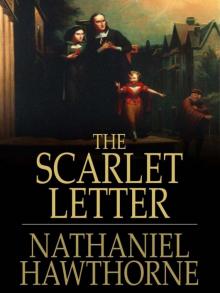 The Scarlet Letter
The Scarlet Letter Young Goodman Brown : By Nathaniel Hawthorne - Illustrated
Young Goodman Brown : By Nathaniel Hawthorne - Illustrated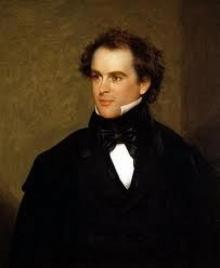 The Birthmark
The Birthmark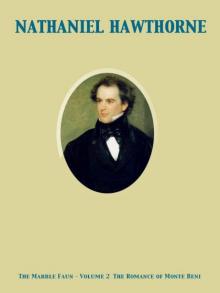 The Marble Faun; Or, The Romance of Monte Beni - Volume 1
The Marble Faun; Or, The Romance of Monte Beni - Volume 1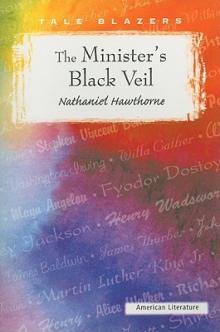 The Minister's Black Veil
The Minister's Black Veil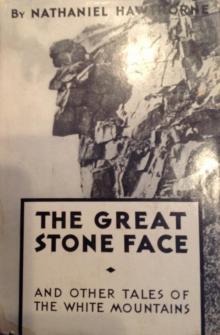 The Great Stone Face, and Other Tales of the White Mountains
The Great Stone Face, and Other Tales of the White Mountains The House of the Seven Gables
The House of the Seven Gables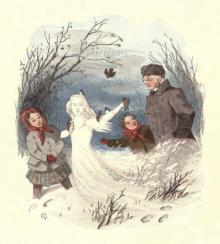 The Snow Image
The Snow Image The Blithedale Romance
The Blithedale Romance Rappaccini's Daughter: By Nathaniel Hawthorne - Illustrated
Rappaccini's Daughter: By Nathaniel Hawthorne - Illustrated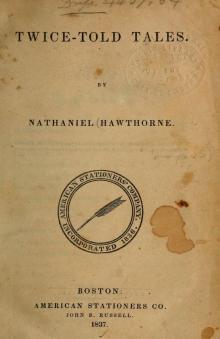 Twice-Told Tales
Twice-Told Tales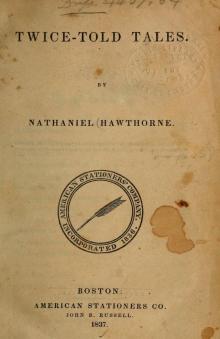 Twice Told Tales
Twice Told Tales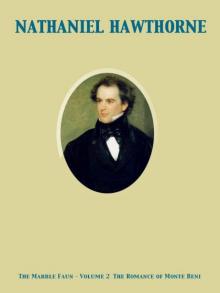 The Marble Faun; Or, The Romance of Monte Beni - Volume 2
The Marble Faun; Or, The Romance of Monte Beni - Volume 2_preview.jpg) Footprints on the Sea-Shore (From Twice Told Tales)
Footprints on the Sea-Shore (From Twice Told Tales)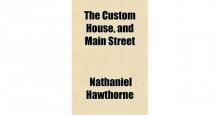 Main Street
Main Street_preview.jpg) The Seven Vagabonds (From Twice Told Tales)
The Seven Vagabonds (From Twice Told Tales) Fanshawe
Fanshawe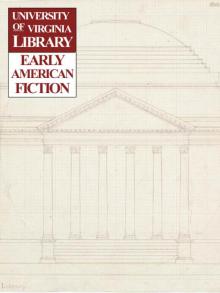 Chippings with a Chisel
Chippings with a Chisel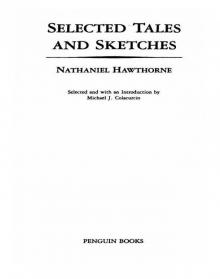 Selected Tales and Sketches
Selected Tales and Sketches Young Goodman Brown
Young Goodman Brown Roger Malvin's Burial
Roger Malvin's Burial The Prophetic Pictures
The Prophetic Pictures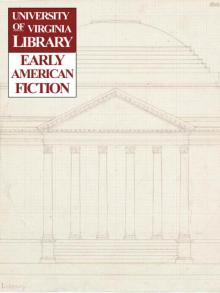 The Village Uncle
The Village Uncle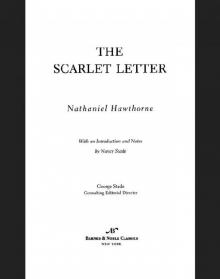 Scarlet Letter (Barnes & Noble Classics Series)
Scarlet Letter (Barnes & Noble Classics Series) The Procession of Life
The Procession of Life Drowne's Wooden Image
Drowne's Wooden Image Hawthorne's Short Stories
Hawthorne's Short Stories My Kinsman, Major Molineux
My Kinsman, Major Molineux Legends of the Province House
Legends of the Province House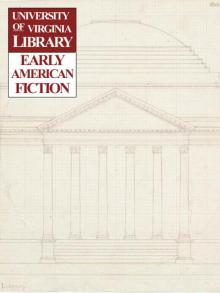 Foot-Prints on the Sea-Shore
Foot-Prints on the Sea-Shore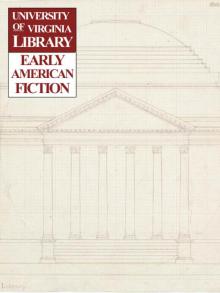 The Haunted Quack
The Haunted Quack Tanglewood Tales
Tanglewood Tales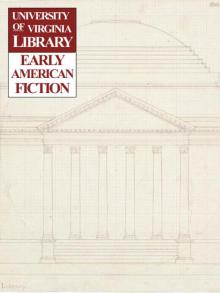 The Seven Vagabonds
The Seven Vagabonds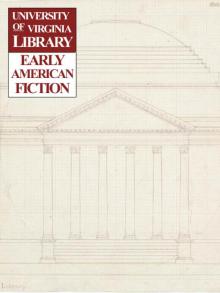 Mosses from an Old Manse, Volume 2
Mosses from an Old Manse, Volume 2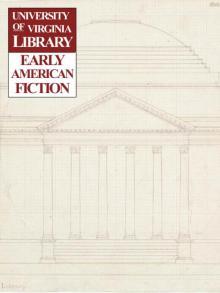 The Canterbury Pilgrims
The Canterbury Pilgrims Wakefield
Wakefield The Gray Champion
The Gray Champion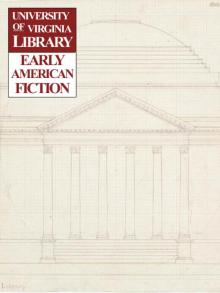 The White Old Maid
The White Old Maid The Snow-Image: A Childish Miracle
The Snow-Image: A Childish Miracle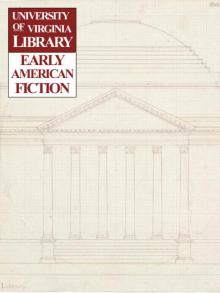 The Gentle Boy
The Gentle Boy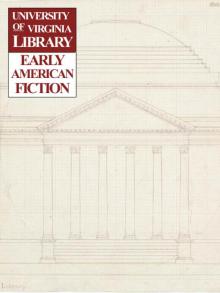 Mr. Higginbotham's Catastrophe
Mr. Higginbotham's Catastrophe![The Threefold Destiny: A Fairy Legend, by Ashley Allen Royce [pseud.] Read online](http://i1.bookreadfree.com/i2/04/10/the_threefold_destiny_a_fairy_legend_by_ashley_allen_royce_pseud__preview.jpg) The Threefold Destiny: A Fairy Legend, by Ashley Allen Royce [pseud.]
The Threefold Destiny: A Fairy Legend, by Ashley Allen Royce [pseud.] Lady Eleanore`s Mantle
Lady Eleanore`s Mantle The Great Carbuncle
The Great Carbuncle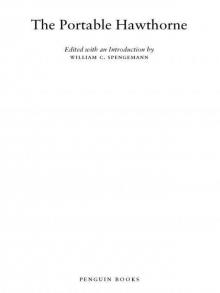 The Portable Hawthorne (Penguin Classics)
The Portable Hawthorne (Penguin Classics) True Stories from History and Biography
True Stories from History and Biography